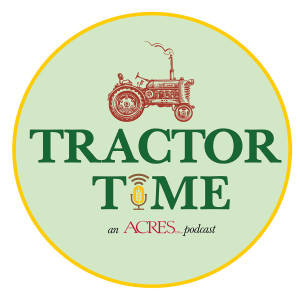Episodes

Friday Jan 12, 2024
Friday Jan 12, 2024
On this episode, we speak with Eric & Joy McEwen, Owners of Diggin’ Livin’. They talk about the origin of the farm, the positive effects of having beehives for a landscape, the generic interplay with nature and the need for a new generation of beekeepers.
Thank you for listening. You can learn more about Acres U.S.A. at www.AcresUSA.com.

Friday Dec 15, 2023
Friday Dec 15, 2023
On this episode, we speak with Mollie Engelhart, Executive Chef at Sage Plant Based Bistro & Brewery and owner of Sow a Heart Regenerative Farm and Sovereignty Ranch. Mollie speaks about how her passion for the environment spurred her interest in the regenerative movement and the difficulties that come along with fighting for a better planet.
Thank you for listening. You can learn more about Acres U.S.A. at www.AcresUSA.com.

Friday Nov 17, 2023
Friday Nov 17, 2023
On this episode, we speak with Paul Neubauer, Farm Foreman at Vilicus Farms and owner of P/N Custom Grazing. Paul speaks about his passion for livestock integration with crop production and the inequalities that exist in the agricultural landscape.
Paul Neubauer is a young agrarian and first-generation farmer and rancher. Growing up in Buffalo, NY Paul did not get first-hand exposure to agriculture until after graduating high school when he worked on his uncle’s ranch in Tennessee. He was immediately attracted to raising livestock as well as agriculture in general, and was able to build on those interests while attending Warren Wilson College in North Carolina. While pursuing a degree in History, Paul worked on the school farm, learning about land management and animal husbandry, as well as equipment operation while raising crops and livestock for the students of Warren Wilson. After graduating from college, Paul apprenticed at the San Juan Ranch in Saguache, Colorado through Quivira’s New Agrarian Program. He spent two years working in the high and dry San Luis valley, continuing to grow his skillset in animal and land management. After his time as an apprentice, he continued to work in Colorado for a local rancher, managing a herd of cattle in nearby Gunnison.Paul is the Farm Foreman at Vilicus farms, and manages the day to day operations of the farm as well as managing his own cattle enterprise, P/N Ranch. He is committed to working at the intersection of crops, livestock, land health and people. Paul is certain we are not doing enough as a society to address climate change, the deeply unhealthy food system, massive and unsustainable inequality of the gender, racial, religious and economic kinds and the lack of livestock on U.S. cropland. His work as a foreman and mentor at Vilicus Farms, as well as his time as an apprentice in the NAP program have been in an effort to live closely to the land and pursue remedies to the aforementioned societal ills. Paul’s relationships with his agricultural mentors has been the essential catalyst for his joy in the work of growing food, and his small successes thus far. Inspired by his own experience as a mentee, Paul is dedicated to providing education, mentorship and his friendship to other beginning farmers and ranchers.Paul’s work with land, animals, food and people also extends past the farm gate as he is the president of the Cottonwood Local of Montana Farmers Union. Paul has represented the Montana Farmers Union at the National Farmers Union Convention, and works hard to help create and shape policies that will improve the health of the land and the livelihoods of those who manage it.
Thank you for listening. You can learn more about Acres U.S.A. at www.AcresUSA.com.

Friday Oct 13, 2023
Friday Oct 13, 2023
On this episode, we speak with Harry Greene, Co-founder of Propagate. Harry speaks about the creation of Propagate, how their software generates more profit per acre and the future of agroforestry.
Harry is an agroforestry agronomist, focusing on finance and economics for useful trees on working farms: orchards, windbreaks, silvopasture, and alley cropping. He spent years trail running, swimming, and kayaking made clear the connection between forests, clean air, and clean water. Before an MBA, Harry spent two years as a resident modern pentathlete at the Colorado Springs Olympic Training Center. He competed on the World Cup circuit in the United States, Mexico, and Egypt and at the 2015 World Championships in Berlin. Harry currently resides in Trumansburg, New York, farming chestnuts, black locust, and other tree crops on 50 acres.
Thank you for listening. You can learn more about Acres U.S.A. at www.AcresUSA.com.

Friday Sep 15, 2023
Friday Sep 15, 2023
On this episode, we speak with Kelly Mulville, Vineyard Director of Paicines Ranch. Kelly speaks about how his passion for holistic agriculture developed, the technics he employs at Paicines Ranch and the future of the industry.
For the past 25 years Kelly Mulville has managed and consulted with vineyards, farms and ranches throughout the western USA, Spain and Australia. His focus is on combining experience in farming and viticulture with holistic management in order to design and manage more ecologically, socially and economically sound farming practices. This usually involves a considerable amount of help from livestock. Kelly has been vineyard director at Paicines Ranch since 2014 and does design/advising work for vineyards.
Thank you for listening. You can learn more about Acres U.S.A. at www.AcresUSA.com.

The Voice of Eco-Agriculture
Founded in 1971, we strive to be lifelong educational partners for farmers, ranchers and growers of all kinds. We strongly believe to farm economically, you must farm ecologically.
Learn more at www.AcresUSA.com




